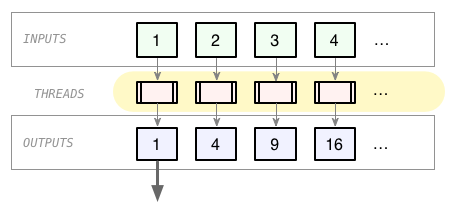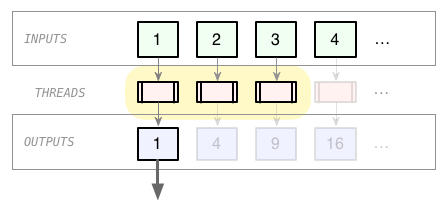Multi-threaded processing with lazy enumerables
23 May, 2013
A project I'm working on at the moment involves trawling a large collection (millions) of S3 objects, and I wanted to parallelize the processing across multiple threads.
As it happens, it's actually pretty easy to process a Ruby collection using multiple Threads:
inputs = [1, 2, 3, 4, 5]
threads = inputs.collect { |i| Thread.new { i * i } }
outputs = threads.collect { |thread| thread.join.value }
outputs #=> [1, 4, 9, 16, 25]
The problem with this naive approach, though, is that you end up creating a Thread for each element of the collection, all at once. For large collections, that's a bad idea. Typically you want to limit the number of Threads you having running simultaneously.

We can fix the do-everything-at-once problem using lazy enumeration:
require 'lazily' # or use Ruby 2
inputs = [1, 2, 3, 4, 5]
lazy_threads = inputs.lazily.collect { |i| Thread.new { i * i } } # lazy!
outputs = lazy_threads.collect { |thread| thread.join.value }
outputs.to_a #=> [1, 4, 9, 16, 25]
Okay, but now we have the opposite problem: the worker Threads aren't created until immediately before their outputs are required, so we don't get any parallelization.

So, what if we reintroduced just a little eagerness? Let's prefetch some of the Threads in the lazy_threads collection, before we actually need them:
require 'lazily'
inputs = [1, 2, 3, 4, 5]
lazy_threads = inputs.lazily.collect { |i| Thread.new { i * i } }
prefetched_threads = lazy_threads.prefetch(2) # <- added magic
outputs = prefetched_threads.collect { |thread| thread.join.value }
outputs.to_a #=> [1, 4, 9, 16, 25]
The implementation of #prefetch is pretty straightforward; it creates a lazy buffer in front of another lazy enumerable, which keeps itself full, as it feeds elements to it's consumer.
Bingo! Now we're starting a limited number of Threads in advance of needing their outputs.

We can size the prefetch "window" to get some parallelization, without creating an explosion of Threads. Even better, we've managed to do it without involving tricksy multi-threading operators like Mutex or Queue. And, the collection of outputs is lazy, so we can use this approach to process large (even infinite?) collections.
This "sliding window" approach to multi-threading is implemented in my new gem, Lazily, as #in_threads:
require 'lazily'
inputs = [1, 2, 3, 4, 5]
outputs = inputs.lazily.in_threads(4) { |i| i * i }
outputs.to_a #=> [1, 4, 9, 16, 25]
(Lazily is an implementation of Ruby2-like lazy Enumerables in pure Ruby. Give it a spin if you're eager to be lazy, and can't deploy to ruby-2.0.0).







Feedback